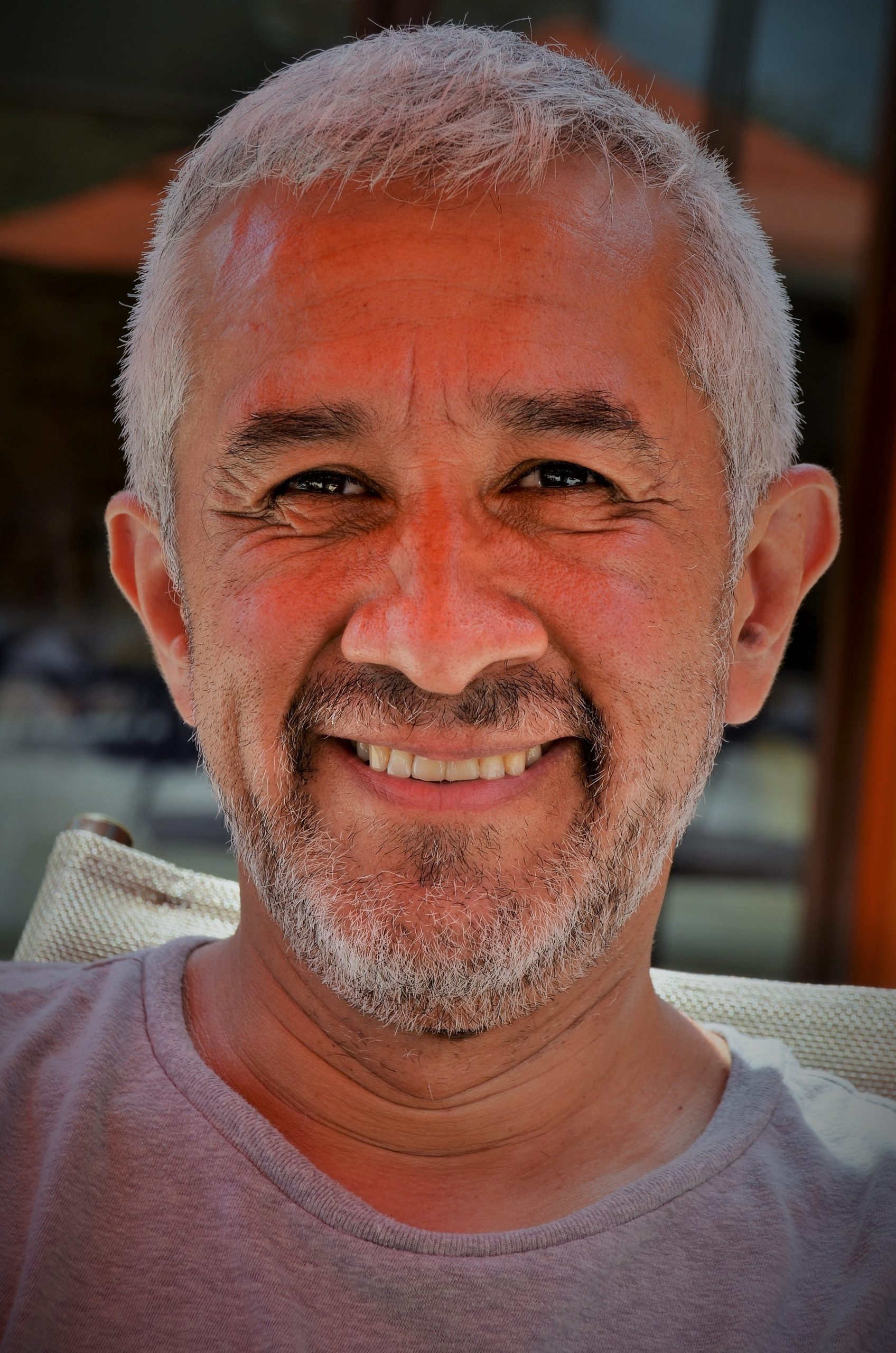Hamas, Hizbollah, Islamic Jihad, DFLP and PFLP
Víctor de Currea-Lugo | April 30, 2024
There is a definition of resistance that goes far beyond the armed struggle, as I was told by social activists, refugees, religious people from different congregations, spokespersons of political organizations and ordinary people, for whom resistance is also (and sometimes more important than the armed struggle) the defense of Palestinian culture, food, language, dance and, of course, the fire of the dream of return.
On the military side, there are several groups: the Al-Qassam Brigades are the armed wing of Hamas; the Al-Quds Brigades are the armed wing of the Islamic Jihad Movement; the Salah-Adin Brigades are from the Popular Resistance Committees; the Ansar Brigades are led by a sector of Al-Fatah, and another sector leads the Al-Aqsa Martyrs Brigades.
The Popular Front for the Liberation of Palestine has the Abu Ali Mustafa Brigades; the Democratic Front for the Liberation of Palestine has the National Resistance Brigades, also called the Martyr Omar Al-Qassem Forces. Resistance is something that goes beyond guns, but there is a space here for those who are fighting from armed resistance. The fear that resistance produces in Zionism is great, because it can precipitate a regional escalation that they do not want and because its military capacity is relevant.
Here you can download the interviews in ARABIC, Spanish and French
The Islamic Jihad Movement
The Islamic Jihad Movement is less well known than Hamas, although it is the second largest political-military force in Gaza. Sheik Ali Abou Shahin , a member of the Jihad’s political bureau, gave me an interview from which one can extract lines of his organization’s policy.
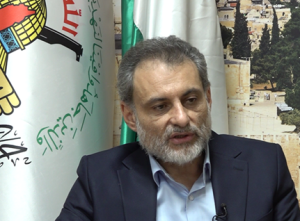
The name Jihad (meaning effort) has been greatly distorted in the West, where it is wrongly and even maliciously defined as war. One of my first questions is about the balance between Islam and nationalism within his movement and he replies: «We are a national movement; our view of the world is based on Islam. Sometimes it is not easy to separate national identity from religious identity; but that does not imply creating a religious state, an Islamic state. In political terms, we are a national liberation movement; we have never fought beyond the geography of Palestine.»
He clarifies that they are not fighting against Israel because they are Jews, «but because they are occupiers. Everyone is free to believe in whatever he wants; the Koran itself says that one cannot impose one’s faith by force; but one thing is a faith and another is who my occupier is».
«Our movement exists because there is an occupation that we must resist,» he adds. Because of that occupation, Palestinians are scattered, some in nearby countries and others in more remote regions. And there is a group of Palestinians still living in Palestine, «exposed to arrests, assassinations and repression».
Historical determinants always appear in the analysis: «The United Kingdom, since before World War II, following its own agenda, helped to relocate Jews in the territory of Palestine and did so at the expense of the Palestinian people.» He reaffirms that Palestine was taken by force, «through massacres. Those massacres tried to be covered up and they hoped that the Palestinians would keep quiet.» But they didn’t. «As a national liberation movement, we have the right to resist, as recognized by international law,» and he cites, as an example, the French resistance against the Nazis.
They participate, from the beginning, in the Al-Aqsa Flood operation. «We are not a regular army; we resist as part of our right to self-defense», but before this action, as he mentions, they have seen and suffered the progressive deterioration of the situation in their land.
He believes that on October 7, the Palestinians did not make an attack, but an act of defense, after years and years of attacks by Israel. «The narrative that Israel presents is that it is the victim of an attack, but that is not the case. Israel is the oppressor, the occupier, the aggressor. And despite the United States and the military asymmetry, we will continue to resist.» Faced with the dilemma of one or two states, he answers me: «the real dilemma is whether to lose the land or to get rid of the occupation». The other problem is that «Israel does not accept the creation of a Palestinian state».
Relations with other Palestinian sectors have at times been strained, especially with the Palestinian Authority. «We fight for internal unity, both on the battlefield and in the political arena. Al-Fatah continues its path of negotiation, we do not see results, but first and foremost we are for internal dialogue among Palestinians.»
The Jihad Movement is closer to the identity of Hamas than other organizations: «In our relationship with other brigades, especially those of Hamas, we have very high coordination both in Gaza and in the West Bank. With Hamas, we share that we are resistance groups, Muslim and Palestinian movements. Sometimes we may disagree on tactical things or small differences; but our strategy is the same.» For example, «in the 2006 elections we decided not to participate; they are more differences of opinion.»
The development of resistance in Gaza contrasts with a certain kind of silence in the West Bank, so I raise the possibility of a third intifada. Sheik Ali clarifies to me: «We must begin by remembering the struggles already fought by and in the West Bank, without forgetting that Israeli operations against the West Bank are constant. Today there is a new reality. We are not in the same generation of the previous intifada, but it is clear that a new uprising is coming».
Is this really a new context? I ask because sometimes the Palestinian struggle seems to be repeating itself like a loop, as if it is not moving forward. He answers me that the Palestinian people «believe in the resistance because they want to change the reality and because we have seen results. The United States wants to change the geography of the Middle East, starting with Gaza».
The Democratic Front for the Liberation of Palestine, DFLP
The Democratic Front for the Liberation of Palestine (DFLP) is one of the resistance organizations established 54 years ago, during which time it has participated in numerous military operations and has more than 400 martyrs. Another 7,000 of its members have been in Israeli prisons. These figures come from my dialogue with Ali Faysal, a member of the Political Bureau of the PFLP and deputy chairman of the Palestinian National Council, the Palestinian parliament.
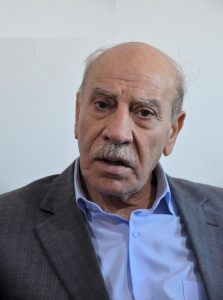
The FDLP is a leftist political party that is part of a larger and better-known organization: the PLO. And being part of the PLO implies a struggle for the representation of different sectors in the Palestinian voice, based on two elements: «resistance and unity». At the same time, the PFLP has its own armed wing, the National Resistance Brigades, also known as the Martyr Omar Al-Qassem Forces, which is part of the armed resistance and shares political and military spaces with Hamas in Gaza. After October 7, this group insists that the main thing is the fight against the occupation; «the rest is secondary».
In the West Bank, the Front has also been resisting, there it has placed martyrs and captured people. For the Front, «there cannot be a state in the West Bank without Gaza, nor a Palestinian state in Gaza without the West Bank; and neither without Jerusalem as its capital.»
The PFLP Brigades were also present in the October 2023 Operation from the very beginning, fighting the Israeli Army. Operation Al-Aqsa Flood, Ali Faysal tells me, «is a battle of all factions of the resistance and of the entire Palestinian people.» He describes it as «a direct blow to the foundational bases» of the Zionist state and also «against the continued growth of settlements.» The occupation seeks «the mass displacement of our people to the Sinai desert».
The FDLP defends the right to self-determination and Jerusalem as the capital of the State of Palestine. Ali Faysal disproves the Zionist myth that «Palestine is the land without people for the people without land». Zionism was built from the forced occupation of one people on the land of another, which explains the ethnic cleansing. And that is what they want to repeat in Gaza, «a colonial scenario». He adds: «Israel has been unable to win,» despite the help of the United States.
The PFLP is proof that there are not some Palestinians from Gaza and others from the West Bank (he calls that discourse «a Hollywood creation»), that there are more communicating vessels between the different Palestinian sectors than we know, and that it is not a dichotomy (PLO versus Hamas) but that the Palestinian political landscape is more complex. The Operation, he clarifies, «not only deepened Palestinian national identity, but brought the Palestinian struggle back to the forefront of public opinion in the Arab world and the world at large.»
The FDLP’s differences with other Palestinian groups were in the Madrid dialogues with Israel, especially because the issue of settlements was not adequately addressed. «Oslo sought to turn the West Bank into a land ‘in dispute’ rather than a land of the Palestinian cause» (he says this because of the division of areas A, B and C), which was exploited by Israel to expand its settlement policy. It is clear to me that neither this issue nor that of the refugees will be forgotten by them in an eventual negotiation.
Another mistake of Oslo was «to leave the Palestinian economy subject to the Israeli economy: no own currency, no industrialization, no national production. All exports go through Israeli ports». Without its own economy, there can be no sovereignty. The FDLP does not recognize as valid what has been signed with Israel, as long as Israel continues to detain and kill Palestinians. Part of its current struggle in the diplomatic field is the recognition of Palestine as a full state before the UN and not, as it is today, only as an observer state.
I ask about the differences with other sectors of the PLO, such as the vision on the resistance and on the Oslo Accords, and Ali Faysal answers me: «the PLO is the representative of all Palestinians and within it we must resolve the differences», not outside, «even the PLO should include Islamic Jihad and Hamas». He insists that «as leftists, secularists and socialists, we believe that change must come from within; we believe in unity, in the debate of contradictions». The Front proposes two steps, given the impossibility of holding elections: an inclusive Palestinian leadership of all factions and a common strategy aimed at «establishing a unified leadership for the popular resistance». These steps would seek a rethinking of the current Palestinian Authority.
Party of Allah, Hizbullah
Hizbullah is a very disciplined organization. Its militants are not very prone to give official statements without authorization and even less so in times of war. But there are political analysts with authority recognized by this group to speak about it, without necessarily being in its ranks. This is the case of Hassan Alayan, of the National Media Encounter.
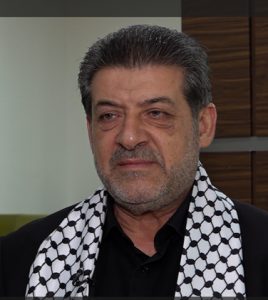
I began by asking about the nature of Hezbollah, which in the West is presented as a terrorist group. His answer was based on citations to the right to resistance and the legal framework on the legitimacy of a people to expel occupiers from their land: «But when that right is seen from the West, it all depends on their interests and, thus, every resistance group is presented as terrorist.» That is the U.S. agenda.
The permanence of the Israeli state in the region would not be possible without the support of British, French and American colonialism; because of that support «Israel has not complied with a single one of the United Nations resolutions on the Palestinian issue since 1947». He tells me: «Palestinian resistance began long before the plan to partition the territory, it began in the struggle against British colonial rule», which made possible the creation of the Zionist project. It is not, then, a recent cause.
As in other organizations in the Middle East, there is a presumed tension between their nationalist discourse and their explicit commitment to Islam. Hassan points out that «Resistance movements have proven results, and the most effective ones are those with a religious component. For Hezbollah, it is not necessary to separate the political component from the religious component.» They see this dual nature as an advantage rather than a disadvantage. Although this group has a faith, it operates in Lebanon under a premise of «national calculation to defend the national soil».
An unavoidable theme is the 2006 war against Israel, also as a space for military learning. «Hizbullah has been learning since 1982. In the beginning, they were small cells, without the political capacity we see today. It has a clear hierarchy; it learned from 2006, but also from the war in Syria.» If Hizbullah drove Israel out of Lebanon in 2000 and stood up to it in 2006, it is possible that in 2023 it will be a much stronger enemy.
But that self-strength is often associated with being a supposed «caricature of Iran.» On this Hassan insists that «Hezbollah acts independently, that it is a political party acting under its own volition,» but notes that there is an attempt to promote the axis of evil narrative: all groups in the region are terrorists dependent on Iran. «The truth is that Operation Al-Aqsa Flood is 100 percent Palestinian.»
But that resistance, while fighting on national geography, is expanding in the region in a coordinated way, especially in Syria, Iraq, Iran, Lebanon, Yemen and Palestine. Hezbollah has said that if attacks on civilians in Lebanon continue or if there is a perceived failure of the resistance in Gaza it would enter the war fully. Will that be true, I ask. For him, «The U.S. and Israel know the importance of the resistance and its capabilities on the Lebanese-Israeli border. Certainly, if Gaza needs the support, Hezbollah will go in full force.»
It is not only a question of the resistance being able to strike, that is why I ask about the real possibilities of winning, not from desire, but from a more rational calculation. My interviewee smiles almost without letting me finish the question to answer: «of course there are military differences of capability, but the resistance is moving out of real conviction, while the enemy is fighting without the necessary will. If it had been based only on military calculations, then Hamas would not have done anything of what it has done since October 7.»
Palestine is, since then, the world news and will be for a long time, at least as long as Israel is at risk. «The Al-Aqsa Flood Operation must be studied as a successful experience», taking into account that it seems to be more the fruit of will than of rational calculation. I am left with the feeling that resistance is more a feeling than a package of ideas.
In addition to this formal interview, I interacted with people from Hezbollah who were providing me with elements for the debate. These voices, from their militants, provide more analysis, although they ask me not to quote them, and even less as an official source. With this clarification, I share here some of the issues that are being discussed within Hezbollah.
«Hizbullah is a resistance force. They are the people of these villages (in southern Lebanon) who expelled Israel in 2000. Here, during the 1980s and 1990s, Hizbullah engaged in guerrilla warfare against Israel’s occupation.» In 2006, Hizbullah learned the importance of having more training, more technology, more weaponry. Since Israel lost in 2006, we know there is a pending agenda. In Syria, «Hizbullah fought like an army, learned from classic warfare and how to use a wide variety of weapons.» «Israel knows that all this has made Hizbullah more of an army than a small group.»
In that resistance, Hamas is the major player. «Anyone who fights against Israel is our friend, our brother. We do not mind that they (Hamas) are Sunni and we (Hezbollah) are Shiites; that is not a problem, it is not a religious issue». But Hezbollah’s relationship with Iran immediately comes up: «We are a Lebanese political party. Iran is an ally, not a boss.»
I ask about how they see Yemen’s entry at this juncture. «It was to be expected; they have been fighting Zionism for years and have nothing to lose; they are our cousins.» One of the people I talk to highlights the strategic position of this country on the Red Sea. «Part of the Muslim norm is to defend the umma – the Muslim community – which other Muslims don’t do.» Likewise, there are expectations about the Iraqi and Syrian Brigades that have declared themselves part of the resistance. And he mentions to me Europe’s support for Ukraine, «that’s the example other Arabs should follow with the Palestinians.»
Within the group they do not fear that the conflict will spread, but it is not desirable. They know it could be the beginning of World War III. They know that Israel is not careless, but fully alert. «But what works with Israel is not conventional warfare, but guerrilla warfare.»
Islamic Resistance Movement, Hamas
It was not easy to get an interview with authorized Hamas spokespersons in Lebanon, but I was finally able to do so in Johannesburg, South Africa, as part of a Palestinian solidarity event. There I was reunited with a doctor, Basem Naim, whom I had interviewed in a Gaza hospital in 2008. He referred me to another official Hamas spokesman, the head of West Asia, Khaled Qadomi , who was present at the same meeting.
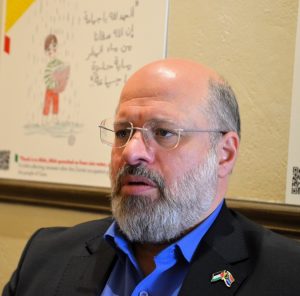
It was inevitable to ask about the nature of Hamas, and Khaled answers: «Hamas has three pillars: being Palestinian, being a national liberation movement and believing in an Islam that is tolerant. Those three pillars go hand in hand.»
One of the most widespread narratives, even among people in the field of international relations, is that Hamas was created by Israel and the United States, and not something authentic from the Palestinians. In posing such a hypothesis, my interviewee clarifies, «Since the 1970s, the concept of struggle and its objectives have been discussed in the Palestinian streets in different spaces: culture, economy, media, schools, trade unions, political parties…» and thus he summarizes for me the birth of Hamas «before the name Hamas.»
After the intifadas, came the 2006 elections. «Our people demanded our participation in the 2006 elections, an election that had the supervision of President Carter himself. And we won. But we did not have the possibility to govern even one day in peace, the countermeasures, embargoes and pressures came. They punished our people for their own decision (to vote for Hamas). We are not just a political party, but a trend among the people, even beyond Palestine; we see it in the marches all over the world in support of the resistance.»
In the midst of this interview, I recall my experience in Gaza, where I saw that Hamas was much more than its brigades; that is, more than an armed wing. «We believe in a holistic concept of resistance. The axis is an armed struggle because we are under occupation. We have explored negotiation, we love to dialogue, we just want a respectable life, but not at the cost of our rights.»
Hamas and the Palestinian Authority have had a history of disagreements that I should have asked about. «Today there is not a single word that takes us away from unity; we are all united to stop the war. In the West Bank the situation is worse, we have lost hundreds of Palestinians, the Al-Aqsa Mosque is empty, civilians are being detained, they increased the number of military checkpoints. We are united, there is no room, at this moment, to talk about ideology or party politics, we are united in stopping the Israeli aggression.»
A question I have heard in many forums is whether Hamas took into account, before its October 2023 campaign, the intensity of the response that Israel could give in the military field, causing so much damage to the Palestinian people; this is how I put it to them. The Hamas spokesman tells me: «Remember how Israel responded to the freedom flotilla: people who came, not to help Hamas, but to help the children of Palestine. Israel shot at them. That is the real face of Israel, which has committed crimes for 75 years. In 1948 it wiped 600 villages off the map. That is the new Nazism. The killing of Palestinian civilians is Israel’s responsibility (not Hamas’).»
Is it possible that we are dealing with a militarily overrated Israel and an underrated resistance? «The struggle for independence does not begin with a calculation of how powerful you are. We have studied many examples, of the Vietnamese, of the Filipinos, of the French Revolution, of the Japanese kamikazes, of all those who have fought against colonial power. We have a small army, we are at least 40,000 fighters. Of those, only 3,000 participated in the action of October 7. And we attacked two pillars of the enemy: the economy and security,» the doctor explains to me.
And about his preparation tactics for the recent operation, he says: «the construction of tunnels, the installation of oxygen, the manufacture of rockets… we did everything from scratch, from the stones. We have rockets with 200 kilometers of range» and with that preparation «we penetrated the electrified border between Gaza and occupied Palestine; we used parachutes as if they were jets. Necessity is the mother of creation».
They know they are not alone. «It is the duty of every rational voice in the world, not just Muslims or Arabs, anyone who shares human values must support our cause. Our friends in Hezbollah, Iraq and Yemen offer their blood,» he says, and further highlights Hezbollah’s role in striking the Israeli Army and producing displacement of settlements.
«Palestine deserves more» because we are fighting a global war. «In the world, there are countries like Colombia that are in the streets,» he says. And he clarifies: «I’m not flattering him, (Colombians) feel the pain that we feel, we know that they have diminished their relations with Israel. Colombians are more Arab than Arabs and more Muslim than Muslims and they have nothing in common with us, except human feelings».
Popular Front for the Liberation of Palestine, PFLP
The Popular Front for the Liberation of Palestine (PFLP) is a Marxist organization, which combines political and armed struggle. It is part of the PLO while also being part of the armed resistance groups confronting the Israeli occupation.
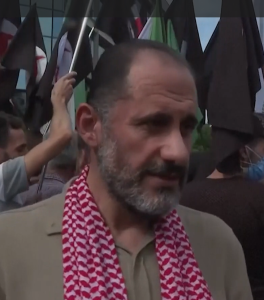
Contrary to other parts of the world, I have always perceived that in the Middle East the political and the military are not two mutually exclusive methods, but rather, more than elsewhere, they go hand in hand. This is confirmed to me by the PFLP spokesman : «We cannot establish borders separating the political and the military» since «in the national liberation struggle, political and military dimensions have been closely intertwined».
The PFLP has an armed wing, the Martyr Abu Ali Mustafa Brigades, which participated in Operation Al-Aqsa Flood and is part of the axis resisting the Israeli invasion. «From the first moment of October 7, 2023, we declare that the battle of Al-Aqsa Flood is one of the stages of the struggle led by our people.»
This organization is Marxist-Leninist and from this ideology, they think about the Palestinian struggle. «The Palestinian people are waging their struggle against the Zionist project as the spearhead of imperialism in the region. The victory over this project is, in reality, a defeat of imperialist interests, led by the United States, so our vision is established on class foundations. The list of enemies is headed by the Zionist entity, its allies of the imperialist powers and the reactionary Arab regimes».
The following discussion revolves around the management of internal tensions in the Palestinian bloc, in the face of the undeniable contradictions it faces. «Since its founding, the Popular Front adopted democratic dialogue as the basis for managing and resolving internal contradictions or conflicts at the Palestinian level.» He clarifies to me that the Front «rejected and never accepted to be part of sectarian coalitions at the expense of the struggle against the Zionist enemy.»
For them, unity is based on a «program of resistance» and from there they propose to «close ranks, heal wounds, reduce the gap and bring points of view closer between forces and detachments» understanding that «dialogue and only democratic dialogue is the basis for any solution to internal disputes or contradictions».
Although they are part of this coalition called PLO, they distance themselves from any hope in the Oslo Accords: «the Oslo Accord did not put an end to the Zionist entity, but, unfortunately, the Palestinian Authority continues to cling to this Accord, of which nothing remains on the ground». He stresses that «occupying colonialism cannot give up its own project on its own, but only when it is forced to do so». In this sense, he characterizes these Agreements as a space for «dismantling and destroying the Palestinian cause as a cause of liberation, turning it into a question of disputed lands».
Haytham Abdo states that this is «the fall of a Palestinian option pushed by reactionary Arab regimes into a swamp of illusion, which would only result in drowning and death». He knows that almost nothing can be expected from Arab regimes that are functional to Zionism: «The expansion of US military bases in most Arab countries constitutes a strong support to the Zionist enemy». He also recognizes: «The battle of the Al-Aqsa Flood demonstrated how quickly the imperialist powers mobilized to support and back the Zionist entity»; he specifies that «some regimes have established a supply line and a direct bridge through their territories to counter the blockade of the (Zionist) entity».
The Palestinian struggle did not begin on October 7. That is why it affirms that «if the world will not take into account the rights of our people, there will be no stability or security in the region or in the world». The PFLP does not forget that the enemy is powerful: «We know that the camp of the Zionist-imperialist enemy will not back down or retreat easily», however, it adds that «these extremists are acting against all humanity and digging the grave of the entity with their own hands».
LIST OF INTERVIEWEES
Sheik Ali Abou Shahin, member of the political bureau of the Islamic Jihad Movement (November 2023, Beirut, Lebanon).
Ali Faysal, member of the political bureau of the Democratic Front for the Liberation of Palestine -FDLP- and vice president of the Palestinian National Council. (November 2023, Mar Elias Palestinian refugee camp).
Hassan Alayan of the National Media Association. Hezbollah expert
(November 2023, Lebanon).
Khaled Qadomi, spokesman for the Islamic Resistance Movement, Hamas (December 2023, Johannesburg, South Africa).
Haytham Abdo, member of the Central Committee of the Popular Front for the Liberation of Palestine, PFLP February 2024, from Beirut, Lebanon.







